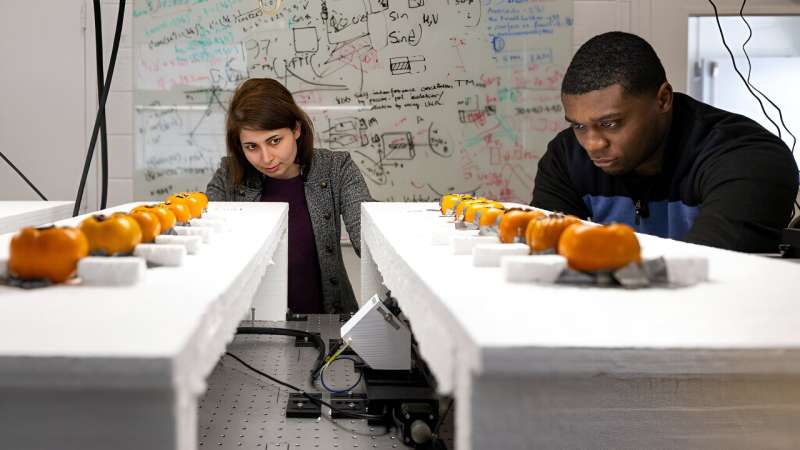This article has been reviewed according to Science X's editorial process and policies. Editors have highlighted the following attributes while ensuring the content's credibility:
fact-checked
trusted source
proofread
Fighting food waste: New system uses wireless signals in the sub-terahertz band to determine fruit ripeness

One bad apple may not spoil the whole bunch, but when it comes to distributing food, a lot of good goes out with the bad.
Now, researchers from Princeton University and Microsoft Research have developed a fast and accurate way to determine fruit quality, piece by piece, using high-frequency wireless technology. The new tool gives suppliers a way to sort fruit based on fine-grained ripeness measurements. It promises to help cut food waste by optimizing distribution: good fruit picked from bad bunches, ripe fruit moved to the front of the line.
Current methods to determine ripeness are either unreliable, overly broad, too time-consuming or too expensive to implement at large scales, according to the new study, presented Oct. 3 at the 2023 ACM MobiCom conference on networking and mobile computing.
"There is no systematic way of determining the ripeness status of fruits and vegetables," said Yasaman Ghasempour, assistant professor of electrical and computer engineering at Princeton and one of the study's principal investigators. "It is mostly random visual inspection, where you check one fruit out of the box on distribution lines and estimate its quality through physical contact or color change."
But this kind of visual inspection leads to poor estimates much of the time, she said. Rather than rely on how the peel looks or how it feels to the touch, advanced wireless signals can effectively peek under the surface of a piece of fruit and reveal richer information about its quality.
Roughly one-third of all food produced in the United States gets tossed each year, according to the Environmental Protection Agency. Worldwide, the United Nations has estimated that half of all fruits and vegetables go to waste. The new study's authors say inefficiency at this scale is only seen in the food industry, and that automated, noninvasive and scalable technologies can play a role in reducing all that waste.
"When we look at the global challenges around food security, nutrition and environmental sustainability, the issue of food waste plays a major role," said Ranveer Chandra, the Managing Director of Research for Industry and CTO of Agri-Food at Microsoft. He said the amount of food wasted each year could feed more than a billion people. And that food waste accounts for nearly 6% of the world's greenhouse gas emissions. "If we could reduce food waste, it would help feed the population, reduce malnutrition, and help mitigate the impact of climate change," Chandra said.
The team, led by Ghasempour and Chandra, developed a system for determining ripeness using wireless signals in the sub-terahertz band that can scan fruit on a conveyor belt. The sub-terahertz signals—between microwave and infrared—interact with the fruit in ways that can be measured in fine detail, leading to readouts of sugar and dry matter content beneath the surface of the fruit's skin.
Next-generation wireless systems, like the coming 6G standards, will be designed to accommodate new high-frequency bands such as terahertz and sub-terahertz signals, the researchers said. But while these bands have begun to spark new communication technologies, the Princeton-Microsoft technique is one of the first to leverage these signals for sensing, particularly for smart food sensing.
As fruit continues to ripen after harvest, its physical, chemical and electrical properties also change. Bananas yellow. Grapes wrinkle. Avocados darken. But for a lot of fruit, it is hard to know how those outward markers correlate to actual ripeness or quality. Anyone who has bitten into a perfectly shiny red apple only to find it mealy and dry understands this disparity.
When a sub-terahertz pulse impinges on a piece of fruit, its rays go more than skin deep. Some frequencies get absorbed, others get reflected, and a lot of frequencies do a little of both with varying intensity. The reflection creates its own signal across a range of frequencies, and that signal has a detailed and specific shape—a signature. By modeling the physics of these interactions and procuring a lot of data, the researchers were able to use that signature to reveal the fruit's ripeness status.
"It was really challenging to develop a model for this," Ghasempour said. She said fruits' many structural layers—seeds, pulp, skin—added complexity to the problem, as well as variations in size, thickness, orientation and texture. "So, we performed some wave modeling and simulations, and then augmented those insights with the data that we collected."
In the experiment, they used persimmons, avocados and apples. Fruits with smooth skins are easiest to measure. The bumpiness of, say, an avocado reflects a weaker signal and produces unwanted effects. But the researchers found ways to get around the bumpiness problem and say that with enough data the method can be applied to most fruits.
They believe this tool can be extended to other kinds of foods, too—including meats and beverages—by using different kinds of physiological markers. Those extended use cases could have big implications for food safety monitoring and consumer choice.
More information: Sayed Saad Afzal et al, AgriTera: Accurate Non-Invasive Fruit Ripeness Sensing via Sub-Terahertz Wireless Signals, Proceedings of the 29th Annual International Conference on Mobile Computing and Networking (2023). DOI: 10.1145/3570361.3613275

















